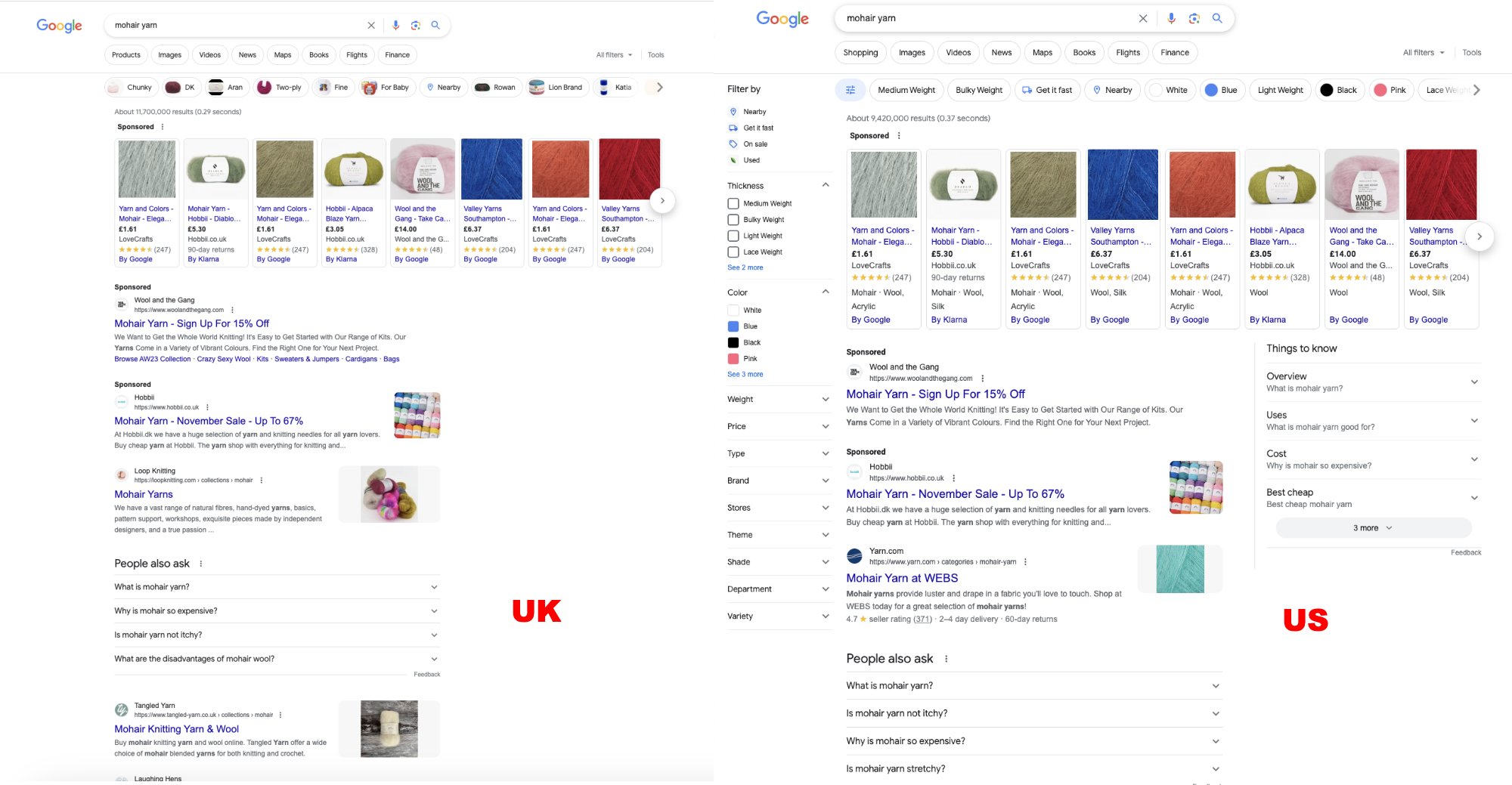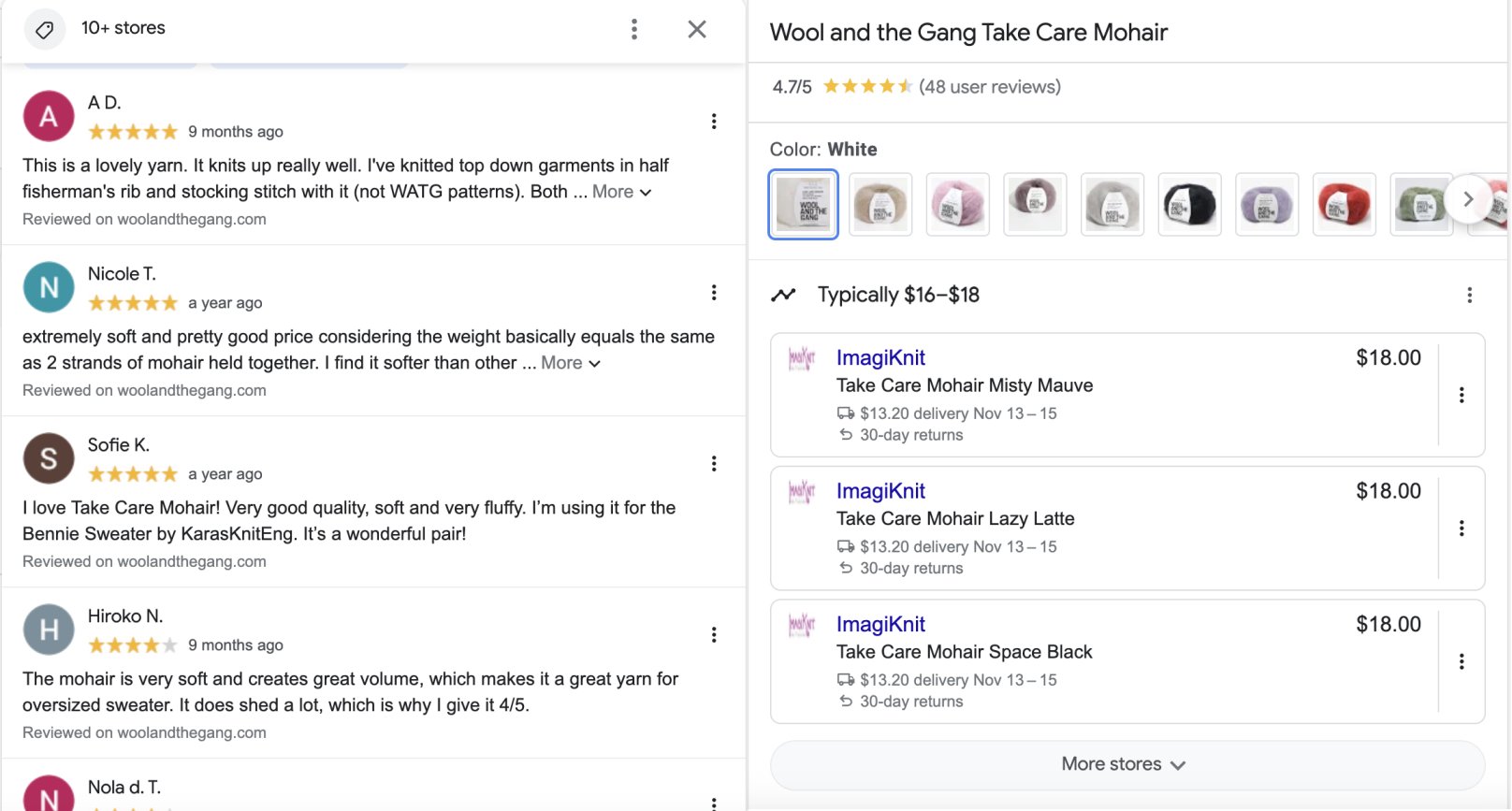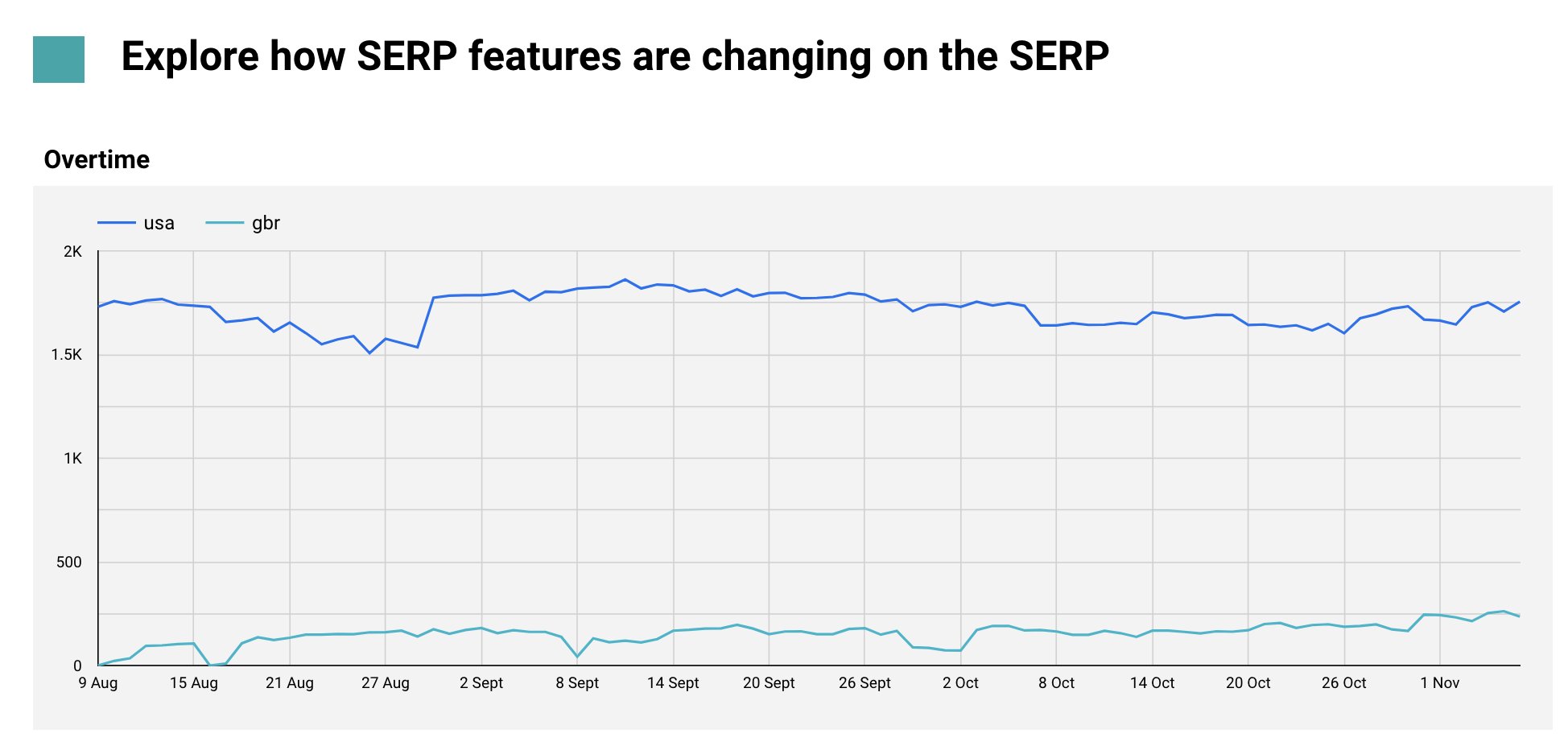Google's One Stop Shop SERP
I think it’s worth revisiting this trend:
"Google wants the searchers journey on Google"
And talking about how they’ve moved towards that goal because we’ve had quite a bit of it recently.
This blog post was inspired by this recent SERP test/change in US e-commerce SERPS.
Let’s compare the same search - "mohair yarn" in UK vs US:

That is a busy SERP. And it's only getting busier. If you use the filters it becomes even more product heavy.
For me it feels like a bad version of the Google shopping tab. If I wanted that experience I'd have gone over.
But as every product manager knows, users hate change and I’m unsure if I’m right or just grumpy about change, but I think the trend is clear.
The underlying trend is moving the searcher journey
We can see the trend from:
- Point you to a place to continue your searching journey.
And onto:
- Finish your search journey in the SERP.
It’s moving from "send you to someones website" and moving towards "show you and send you to the underlying things the website represents".
And second trend of:
- We’ll take more of your content to enable this.
The featured snippet was the first really big instance of this
It embodied both points:
- You now got a direct answer.
- It took content from a webpage to answer it.
And multiple SERP features have continued this.
If and when the SGE lands it will do something similar for content
The biggest newest version of this trend is the SGE.
AI summaries change the bargain Google was built on (give us your content, we’ll give you traffic) substantially and they do it by moving more of the searcher journey to Google while taking the content.
Lots of people have spilled pixels on this so I’ll just link one of the better ones and you can enjoy all the arguments there.
We don’t have it yet, Google clearly haven't figured it out yet, it’s going through iteration and we’ll see how it plays out. But even without it we can see those trends:
The merchant center and ecommerce searches are another area where the search journey is being pulled into Google
Ecommerce searches (in the US) are currently also at the forefront of this change. Price history is being pulled into the SERPS.
Using the filter bar (which is now turned on by default), generates notably more popular products than if you just make the same search without it.
The popular products itself, pulls in more content from across multiple sites. Take this example where it pulls in reviews from multiple sites (primarily the product creator Wool and The Gang) but then doesn't show them at all in the buying.

Again it emphasises those two trends:
- More of the journey happens on Google.
- Your content enables it.
Google doesn’t want to do the end product it just wants the journey
It doesn’t want to literally sell you things, it doesn’t want to be Amazon and handle the shipping or be open table and handle restaurant booking.
But it does want to take you right up to the point of handoff.
Which is fine if you are the underlying thing (e.g. you make a product) and not so great if you’re intermediary who tries to help with the journey. I suspect your business is going to get harder not easier.
Hat tip to Jono Alderson here, who has been talking about this trend (I think he called it Hub and Spoke?, please correct me Jono) since like 2016, while we had barely begun moving in that direction.
Something something profit.
Of course there has always been a way to skip this trend.
Pay money.
Want to appear above that SERP feature, take over this searcher journey?
Just pay some money and it’s yours.
I would hazard that the 2 big problems with the SGE are:
- How do we not take so much traffic that everyone blocks us.
- How do we sell ads so people can buy there way in.
And we’ll probably only see it when they’ve figured that out.
Until Google makes another money printing machine, this will always be a way out.
What can you do about this trend?
Bleh. You can do a couple things, but your natural business will definitely heavily weight how it affects you and all of this isn’t SEO.
Figure our your exposure & quantify it:
- Where are you taking care of the searcher journey?
- e.g. If you’re store and you breakdown your web traffic how much is category vs product?
- If you’re a content site, how much is easily summarisable and what has additional depth which is hard to summarise?
- Quantify the percentage of your total traffic/revenue which is at risk over the next two years.
- Track the number of features, where they appear in the SERP and the space they take up in the SERP. Take these example terms below: "chunky yarn" has popular products appearing far lower on average than "fur yarn". At the moment it's a less risky and less likely to be losing traffic.

- Track the US SERPs even if you're in another country for a look into what's coming. Below you can see the difference between UK and US SERPs.

Can you compete at the end of the journey?
- Are you retailer who competes on price and shipping? Can you win the commoditisation of the selling? If you can then I think you've got a decent chance here
- Is the topic you cover deep and harder to summarise. Is someone just searching for a quick answer or do they want something more thorough?
Can you bypass the journey?
- Hows your loyalty program? Do you delight the customer enough that they won’t start the journey somewhere else. Can you increase the value of those organic sessions and customers who do reach you?
- Are your recipes good enough that people come back looking for yours? (Or vice versa do you have any bad ones which scare people off). My parents search for recipes, test out a couple and then become loyal to whoever had or 1 or 2 they liked.
Can you optimise for the new SERP features?
Let’s take our e-commerce SERP here. What can we do here?
- How are your merchant center ratings & data?
- Merchant center data is now being pulled straight into organic data. So it’s going to matter.
- Make sure you’re not making any structured data blunders that prevent Google from failing to understand your content.
- E.g. if you have multiple offers make sure Google is showing the right one. AggregateOffer sometimes excludes you from merchant listings (hat tip to Brodie Clark for that one)
- Make sure you have high quality product images and consider branding them
- If an image is all someone will see of your product or site better make it a good one.
- Get good reporting for inside the SERP features:
- Track the SERP feature in question (in this case popular products) and see how often you appear in it.
- Track where it appears on average and how much space it takes up.
- The facets on the side are probably generated from what Google sees in the industry
- I think it’s unlikely they’re adding in manually, although I could be wrong.
- Either way the safest move will be make sure you have categories which match the existing ones being shown by Google.
- And that you label your products with language that Google is searching for.
- If you’re particularly large and feeling optimistic you could attempt to change the language people are searching for to match your structure.
Summing it up
I think this trend is possibly going to speed up. The two big pressures I’d point to would be:
- Competition from AI.
- As AI gets better and competes for more search journeys Google is going to feel the pressure to keep up both in quality and that will mean taking over more of the journey.
- Squeezed revenue
- Google is a public company and it needs to keep shareholders happy. That means money and that means ads.
- If the competition increases and more searches move off it looses the opportunity to sell ads and so the pressure will increase to sell ads everywhere else increases.
It won't happen all at once, they don't want to toss the frog in the boiling water, but I think that's where we're probably headed.